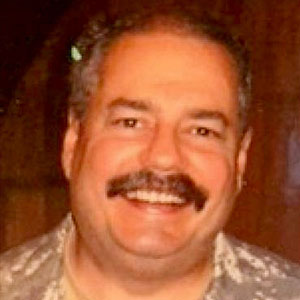Bob Bateman, terminal LTC, apparently doing war tourism in Iraq. Shiny new ACUs! Never been dirty. Quite the infantryman. Just ask him.
By now, if you are not living under a rock, you have heard about the intemperate (to say the least) and frankly stupid political article in an Esquire blog by one LTC Robert Bateman.
In it, Bateman calls for all kinds of gun bans, and fantasizes (there is no other word) about them being enforced at bayonet point by a politicized Army. “We will pry your gun from your cold, dead, fingers,” he writes. You can almost hear him fapping to the thought of it.
Good luck with that, Bob.
Rather predictably,
the
We only linked the resposible stuff (actually, we read every one of those links, and more, and those links make good points). There are people out there calling for Bateman’s head on a stick that are not, unlike the above, speaking figuratively.
We don’t know what happened to him, although we have an idea, but while he’s always been a far-left Democrat, he wasn’t always such a shallow hoser. (He had achierved that status by last year, when he posted a comment at This Ain’t Hell defending SF phony Paul Rieckhoff, the one-tour-wonder of IAVA and IVAW fame. Even though Jonn Lilyea had a photo of Rieckhoff, who never served a day in SF even in a support capacity, posing in greens with an SF patch). Bateman wouldn’t know how SF guys feel about posers like his asshole buddy Rieckhoff awarding themselves our unit baubles, because, like Rieckhoff, he’s never rated any of them.
He was always attracted to an academic life of reading and writing, and after a tour in West Point he landed a plum assignment, for someone seeking a career as a desk jockey, to a think tank fellowship.
It was during this period that Bateman he wrote a book that exposed a 1999 fabrication by Associated Press anti-military reporter Charles Hanley and a cast of dozens of AP minions. Hanley and Co., riffing off a far-fetched story from an already-exposed phony, cooked up a tale of American troops machine-gunning some 350 Korean civilian refugees, and leaving them to rot. It was one of those stories that was, for the Associated Press, too good to check. It got the same treatment from the credulous crowd at the Pulitzer jury, winning a Pulitzer Prize for Hanley and the AP fabulists. The story caused considerable friction between the US and South Korea, as well it should — if it were true, but it wasn’t.
Only afterward did critical stories begin to appear. That story is told in part in this 2002 San Francisco Chronicle story. It describes how Hanley, after correspondence with Bateman turned sour (Bateman realized that Hanley was not a victim of imposture, but a participant in promoting the impostor), tried to threaten a publisher into dropping Bateman’s then-planned book). The Chronicle’s Michael Taylor wrote:
[Hanley] is apparently trying to suppress publication of a new book — “No Gun Ri: A Military History of the Korean War Incident” — that takes another view of what happened at No Gun Ri.
Late last year, Hanley wrote a nine-page letter to Stackpole Books, the Pennsylvania publisher bringing out Bateman’s book this month, saying it would be a “grave mistake” to publish Bateman’s “diatribes and defamations.” A copy of the letter, filled with personal attacks against the author, was made available to The Chronicle.
The letter is the kind of dark threat that gives free speech experts the chills — “an effort at prior restraint,” said Bill Kovach, chairman of the Committee of Concerned Journalists– not to mention the fact that in this case, there is a certain reversal of roles.
“It’s ironic for a journalist, someone whose livelihood is protected by the First Amendment, to be seemingly threatening to curtail the speech of a military person,” saidJames Naughton, president of the Poynter Institute, a journalism school in St. Petersburg, Fla. “The way matters like this tend to get resolved over time is for people to be able to make their own judgments about which version of events holds up on examination. More access to publishable versions, rather than less, seems to be desirable.”
“It seems to me to be out of bounds for one author to try to short-circuit the publication of another author’s book,” said Chris Finan, president of the American Booksellers Foundation for Free Expression. “It’s extraordinary and alarming.”
Hanley threatened Stackpole with a lawsuit. They went ahead and published — and Hanley and the AP writers countered with a book of their own, oddly admitting the imposture of their original and main source, while sticking to claims he generated.
Nonetheless, with [Stolen Valor co-author BG “Jug”] Burkett, Bateman discovered that [Ed] Daily, the 7th Cavalry veteran [and Hanley’s main source], had not been what he claimed — he had not been an officer, he had not been captured by the enemy, he had not received the nation’s second- highest decoration for valor and, most importantly, he had not been at No Gun Ri July 26-29, 1950, the time frame of the incident.
After the critics weighed in on the AP story, the news agency played down Daily’s importance. But before this and other discrepancies surfaced in the spring of 2000, Hanley told Bateman, in one of their e-mail exchanges in March 2000, back when they were friends, that it would be a “superhuman hoax” for Daily to have concocted his military history.
Turns out that Daily was quite capable of concocting that hoax and persuading the Veterans Administration to pay him benefits and give him free medical care from 1986 until the end of 2001. A month ago, Daily pleaded guilty in federal court in Nashville, Tenn., to defrauding the government of $412,839 in veteran’s benefits and medical care.
And he admitted to federal agents that “he had not participated in the alleged massacre at No Gun Ri,” according to James Vines, the U.S. attorney in Nashville.
At the time, the Army conducted an investigation into the No Gun Ri incident, and concluded that some civilians might well have been killed by American soldiers there, but only a few. Bateman wrote in his book that they probably numbered “8 to 35″. A US-South Korean joint investigation was inconclusive.
An article at Salon.com from 2002 also speaks to the Hanley/Bateman disagreement, which had by then become vituperative on both sides:
Bateman spends more than a few pages in “No Gun Ri” outlining his interactions with Hanley regarding the credibility of Edward Daily, one of the star witnesses in the original AP story. Daily, whose specific and emotional testimony the AP team later disavowed in their book “The Bridge at No Gun Ri: A Hidden Nightmare from the Korean War,” was not anywhere near the infamous railroad trestle on the day of the incident, and certainly could not have been one of the two machine gunners at the bridge, as he originally claimed. In fact, Daily was an ordnance mechanic during his military service, didn’t join the 2nd Battalion of the 7th Cavalry until 1951, and probably never saw a day of actual combat while he was in Korea. He recently pled guilty to defrauding the U.S. government of over $300,000 in veterans’ disability benefits for combat-related post-traumatic stress disorder.
Bateman argues that Hanley and the other AP reporters gave preferential credibility and prominence in their original story to veterans who made the most “quoteworthy” statements and allegations, and that when doubts began to arise about Daily, they tenaciously refused to acknowledge them. The AP team received Daily’s official record in December 1999, almost a month before the AP’s story was submitted for the Pulitzer Prize in January 2000. In his book, Bateman offers two March 2000 e-mails he received from Hanley to show that even then Hanley maintained his belief in Daily’s story on the basis of flimsy evidence provided by Daily himself. Two weeks later, the AP story won the Pulitzer.
Hanley feels that the questions raised by Daily’s record did not — and still don’t — significantly undermine the story. “Three months after we published [the original story],” he wrote to me, “we learned of the discrepancy in Daily’s record: despite our inquiries it remained an unresolved discrepancy for us…
Note that even after his exposure, and conviction as a felony-grade fraud – Daily was a mechanic in Korea, but didn’t get there until many months after the incident, when the bridge and railroad track where he supposedly gunned down refugees was solidly in North Korean hands – Hanley was still supporting him, or as Salon’s Judith Greer wrote, “tenaciously refusing to acknowledge” doubts about Daily’s bona fides . “Unresolved discrepancy,” horsefeathers.
If Bateman never did another thing for the USA (and it looks like he never has, actually), he’d still deserve credit for exposing Hanley’s No Gun Ri fabrication.
So what happened to him? Certainly, too long in academia (think tanks count) and staff jobs, and away from command and troops, seems to have unhinged the man. It could be that the academic environment is a bit like exposure to ionizing radiation — there’s a threshold beyond which your brain quits working.
Bateman sells himself as an infantryman today, but he doesn’t seem to have had an infantry gig since he before taught at West Point over 15 years ago. And certainly — if he’s still a serving officer, as he claims — his stalled career hasn’t done his disposition any good. He was a major in 1999, and he’s one grade up — Lieutenant Colonel — today. Most guys who were majors in the Clinton Administration have retired, many of them as Colonels or with stars.
For someone who cloaks his argument in the authority of an infantryman’s uniform, but whose minimal involvement with the last 13 years’ wars has been that of a desk-centric analyst rather than a sharp-end practitioner, his confidence that organized armies will triumph bloodlessly against ill-equipped and loosely organized irregulars is understandable. Those of us who actually took the fight to such irregulars (and had the fight brought back to us) may be excused for having a little more respect for the underground combatant.
And a lot less enthusiam than Bob Bateman has to see said guerilla engaging in our cities and streets.
But we did feel that Bateman’s public service in the No Gun Ri affair needs to be known to the public, even as they’re measuring him for tar and feathers. Call it evidence in mitigation.

Kevin was a former Special Forces weapons man (MOS 18B, before the 18 series, 11B with Skill Qualification Indicator of S). His focus was on weapons: their history, effects and employment. He started WeaponsMan.com in 2011 and operated it until he passed away in 2017. His work is being preserved here at the request of his family.
